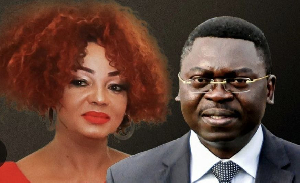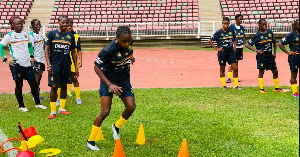Greetings, Your Excellencies! I am touched by your concern over the Boko Haram issue in Nigeria and your decision to try and help Nigeria
defeat the terrorists who have made life so impossible for the residents of North-East Nigeria. This concern has been eloquently articulated by your chairman, President John Mahama of Ghana, who has proposed that the AU should give ECOWAS the authority to set up “a multi-national force” to fight Boko Haram. To be able to achieve this, ECOWAS has requested that the next African Union (AU) meeting in Addis Ababa must include a special session on terrorism. And the Ghanaian President has made a trip to Germany to see the German Chancellor, Angela Merkel, to urge her to persuade her fellow EU leaders to support the efforts of ECOWAS t to assist Nigeria fight Boko Haram.
The ECOWAS chairman clearly intends to lead West African leaders in seeking authority from the AU to create the multi-national force to help combat the operations of Boko Haram. He told the BBC on 17 January 2015 that the number of African countries willing to contribute troops to the force, and how many troops should be sent, would “depend on the discussions at the AU”.
President Mahama pointed out that already, “a consensus” had been reached in the region by “Niger, Chad, Cameroon, Nigeria and Benin” over how to combat Boko Haram. The countries of the Lake Chad Development Authority, he said, had also “come together and agreed to create an international force” which was “supposed to be based in Baga in North-Eastern Nigeria” but had been “overrun recently by Boko Haram.” There was therefore an urgent need to “create a better conceptual plan” so that intervention could be “more effective.” It might take “a couple of months” to implement such a plan, President Mahama envisaged.
However, Excellencies, your own external intelligence agencies operating in Nigeria will have briefed you on how difficult it is to assist the current Nigerian Government in this noble task of seeking to help it return the country into the safe place for ALL its citizens that its government is duty-bound to ensure. The reasons for this difficulty are complex, but the principal one is that Nigeria sees herself as not lacking in either manpower or fire-power when it comes to defending itself. So the country may actually resent assistance from abroad.
Arrogance apart, the Nigerian armed forces, as you would have been told, are a formidable force, estimated to number as follows: Active Front-line Personnel: between 130,000 and 200,000; Active Reserve Personnel: 32,000; and Para-military forces: 300,000 (est.).
The Nigerian armed forces also have a reputation that is second to none with regard to foreign military operations. So much so that the purveyors of jargon coined a new term, “Pax Nigeriana” to describe the situation whereby Nigeria could impose peace on almost any country in sub-Saharan Africa in whose affairs it chose to intervene (apart from South Africa). According to Wikipedia, the Nigerian Army “has demonstrated its capability to mobilize, deploy, and sustain brigade-sized forces in support of peacekeeping operations in Liberia. Smaller army forces have been previously sent on UN and ECOWAS deployments in the former Yugoslavia, Angola, Rwanda, Somalia, and Sierra Leone.”
Specifically, Nigeria, under the ECOMOG flag, sent troops to Liberia in 1990 and 2003; and in 1997 to Sierra Leone. In 2004, Nigerian again sent troops to Darfur, Sudan, under UN auspices, as it did to the Democratic Republic of Congo in 2004. Nigerian troops again went to help Mali in 2013-14. (But significantly, Nigeria did not send troops to the Ivory Coast during the conflicts between that country's rival leaders, Alassane Ouattara and Laurent Gbagbo). Presumably, French intervention in the Ivory Coast rendered a Nigerian effort de trop.
The question to be asked is this: if Nigeria is so powerful that it can make or break regimes in other Sub-Saharan African countries (apart from South Africa), then why is it unable to defeat a local insurgency initially mounted by a ramshackle army that depended almost exclusively on the religious zeal of its followers for success? The answer is this: perhaps when Nigerian troops go abroad, they are properly equipped; they are relatively well paid (almost certainly through allowances paid in US dollars) and they receive relatively good care all round. But at home, the Nigerian armed forces are exposed to Nigerianitis – a debilitating condition that subjects its victims to neglect, occasional callousness, and results in a low morale within them.
Worst of all, the Nigerian armed forces too -- like the rest of Nigerian society -- observe the massive corruption and (especially) incompetence that have been the hallmark of Nigerian administrations in recent years. They must often come to the conclusion that the regimes under which they serve are unworthy to receive the ultimate loyalty of the combat soldier, namely, being willing to give his lifeto achieve the objectives of a military campaign.
A Nigerian soldier recently dismissed for disobeying orders told the BBC: When we fight Boko Haram, it is as if Boko Haram soldiers were wearing bullet-proof [protection] while the Nigeria soldier is only protecting himself with an umbrella.
Furthermore, in the current situation of Nigeria, President Goodluck Jonathan, who is seeking re-election in February 2015, has alienated almost half of the population of his country by being perceived by the North to have reneged on an informal understanding within his PDP, which provided that after the presidency had been occupied by a Southerner for two terms, a Northerner would be the next President. In his defence, it must be said that President Jonathan had not served two full terms by nomination time for the 2015 elections, having succeeded to the presidency on the death of President Umaru Yar'Adua in May 2010 (that is, after Yar'Adua had eaten into his own term by 2 years). But while some say that Jonathan legitimately profited from the two years that were left of Yar 'Aqua's term, others maintain that he, in effect, cheated by enjoying Yar'Aduah's remaining term and still seeking to run for two full terms under his own bat. It is a controversy that will rage for years, but there is little doubt that its very existence has undercut President Jonathan's authority in the eyes of many, especially ambitious politicians in the North, who had sought to win the PDP nomination for themselves and are now out of the party.
This political contretemps has added its weight to the massive corruption believed by many Nigerians to be taking place under President Jonathan, and has made some Nigerians so disaffected with his regime that some of those in trusted positions – including the security services – are believed to be unwilling to conduct the campaign against Boko Haram as vigorously as their military oaths oblige them to do. President Jonathan himself acknowledged this when he blurted out in public not too long ago, that Boko Haram had infiltrated his administration everywhere.
I suggest to you, Excellencies, that it is because of such complexities that the United States and Great Britain, for instance, find themselves unable to render as much military assistance to Nigeria to fight Boko Haram as they would normally, be only too willing to provide. The London missions of Your Excellencies may have reported to you that there was a mini-debate, arising from a Question in the British House of Commons in London, on the Nigerian situation on 12 January 2015. I trust Your Excellencies will find time to acquaint yourselves with some of the things the British MPs had to say. The point was made again and again in the debate that no-one could assist a person who did not seem to want assistance.
Well, all I really want to tell you, Excellencies, is that you should do what, in the military, is known as a full appreciationof the Nigerian situation before you plunge into it. You should not get involved militarily in it on the basis of emotion. As a Ghanaian, I can tell you from memory that Ghana did that in 1960 and lived to regret it: Ghana went to the Congo on the basis of the emotional empathy that its leader, Dr Kwame Nkrumah, felt for the Congolese leader, Patrice Lumumba. The Ghana army was then under a British General Officer Commanding [GOC] by the name Major-General H. T. Alexander, and many of its other senior officers were British.
Technically, they were competent to lead Ghana's troops into the Congo and carry out their mission successfully But the appreciationthey crafted before they left for the Congo must have been full of holes, in that by hindsight, it seemed to have ignored, or glossed over, the social milieu in which Ghanaian troops, under white British officers, would be operating. They were expected, p[perforce, to interactoften with Congolese Force Publique soldiers, but most of these Congolese soldiers intensely hated their own racist whiteBelgian officers, and had indeed mutinied against the Belgians.
The result was that forty-three Ghanaian soldiers were killed when Congolese soldiers made an unprovoked attack on a camp at a town called Port Franqui. The Congolese troops apparently attacked the Ghanaians on the basis of false information fed to them by Congolese politicians hostile to Ghana's presence in the Congo, who lied to the Congolese soldiers that the Ghanaians were acting in collaboration with the Belgians.
In another instance, one Ghanaian battalion had to be disbanded after it mutinied, and the mutineers undoubtedly resented the alleged fraternisation of the battalion's white officers with the Belgians, which they surmised, placed them in danger. Can you imagine how embarrassed President Kwame Nkrumah was, on receiving reports about such sad events?
The upshot of my message to you, Excellencies, then, is this: if you get involved in a situation in Nigeria in which some Nigerians will look upon the presence of your troops there with hostility (especially if they think that the very mooting of the idea will accrue to the benefit of President Jonathan, as he fights a tough election battle in February 2015) you will inevitably come to rue the day that you decided to intervene in Nigeria.
Be warned that you will be going into a country whose people have a polity based on loyalties that are incredibly diffuse; and moreover, a country whose leader is himself so nonchalant about national affairs that he took 40 days to make a statement about the abduction of 300 schoolgirls at Chibok, when the Chibok girls had been the subject of sensational world headlines for days and days!
In other words, if you must go, do candidly make clear to President Goodluck Jonathan that – as a Ghanaian proverb has it – “it is only when you try to climb a tree with adequate proficiency that those on the ground may feel inspired enough to push you up it!”
Please don't rush to go and kill the children of other people in a military campaign whose basis is so difficult to sketch that even the British -- who, after all, created the Nigerian army and has kept in close touch with it over the past half century during which Nigeria has been independent -- don't want to hear of it.
Opinions of Thursday, 22 January 2015
Auteur: Cameron Duodu















